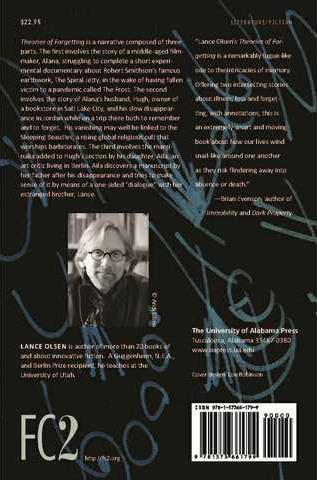"THEORIES OF FORGETTING," by Lance Olsen, University of Alabama Press, $22.95, 367 pages (f)
It’s not surprising that “Theories of Forgetting” is a story worth forgetting.
Lance Olsen’s novels tells three stories in a wacky, offbeat and ridiculous way that bring the reader down, around and through a rabbit hole of confusion. One story is of Alana, a filmmaker, another is of her husband, Hugh, and the last one a series of margin notes by Aila, Hugh’s daughter. And it doesn’t get any easier to understand from there.
The main problem with Olsen’s book is that there’s no easy way to begin reading. Both covers are the same, and page numbers start at both ends of the book, too. And while Hugh’s story is written on one of the page with Aila’s notes right beside, Alana’s story is written on the opposite side of the page, causing the reader to flip the book entirely to read that story.
And while the layout is confusing in its own right, the stories, too, are unreadable. Hugh disappears from the world he’s known, but he also brings up ideas from the world he has known, so there’s no true understanding of where he is. Aila’s tale is readable, since she’s only writing notes, but even her notes don’t always connect with the story. Alana’s journal-like story is the best of the bunch, but ultimately it starts to get more and more confusing toward the end.
Olsen does save himself by adding some memorable quotes — like “Somebody will always be waiting for you who doesn’t know he or she is waiting for you” — and does do well to show a familial connection.
But the book is hard to understand and keep up with to make it an enjoying read. There’s a fair amount of curse words, too, and it does touch on some heavier themes that might be too deep for such a lightly written and off-beat novel. It’s no question if Olsen settled on one of these stories and developed it more, then this novel would be fantastically done.
That might be the point of this, though. Life is a confusing and unsorted mess. And like Olsen’s story, maybe we’re not meant to understand it all.
Email: hscribner@deseretdigital.com
Twitter: herbscribner








